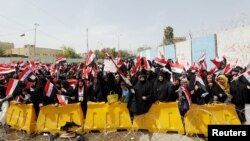Iraqi firebrand Shi'ite cleric Moqtada al-Sadr, whose followers stormed Baghdad's heavily fortified International Zone Saturday to shut down parliament, has in recent months mounted an increasingly visible campaign to pressure the government to move forward with promised reforms.
In March, Sadr first called on Prime Minister Haider al-Abadi to act on promises to address government corruption and cronyism by replacing current ministers with technocrats - experienced leaders without political affiliation.
So far, Abadi has been unable to gain sufficient legislative support for his reform measures, prompting Sadr's followers to stage weekly rallies to pressure the Abadi government into action.
On Saturday, protesters vented their rage, climbing over blast walls to rampage through the parliament building's main chamber.
Sadr, the 42-year-old charismatic scion of one of Iraq's most prominent Shi'ite families, was himself a victim of sectarian violence, as Saddam Hussein sought in the 1990s to fortify his Ba'ath Party's hold on Iraqi daily life. Sadr's revered father, Ayatollah Muhammad Baqir al-Sadr, and two of his three brothers were assassinated in 1999. Saddam denied responsibility.
The younger Sadr first gained international visibility as an outspoken critic of the 2003 U.S.-led invasion that toppled Saddam. His so-called Army of the Mahdi was subsequently linked to repeated sectarian violence in the capital, which only began to wane as U.S. officials announced plans to withdraw U.S. combat forces from the country in 2011.
Washington Post reporter Liz Sly, who witnessed Saturday's confrontations, described Sadr's outward goals as part of a push to stop graft and bring good government to the divided country, widely seen as rife with political corruption.
But she also noted, in comments to U.S. public television, that Sadr, who has maintained a low profile in recent years, is competing for power among other militias as general elections loom in 2018. She said "most people are putting [Saturday's events] into the context of a bit of early election campaigning."





